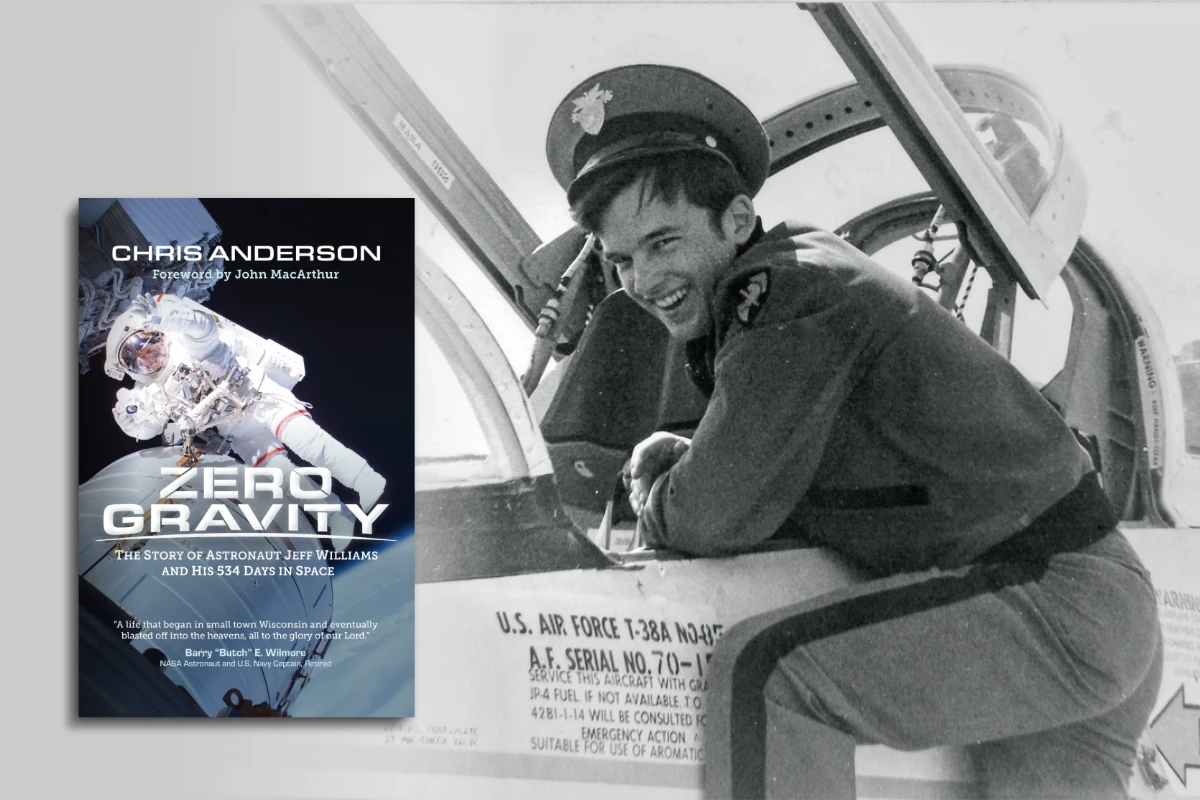
Blog
The Right Stuff

An excerpt from Church Works Media’s new biography—Zero Gravity
For Jeff Williams, West Point was both a challenge and a test of resolve.
When Jeff first left Wisconsin for West Point, he wasn’t sure he would cut it as a cadet, or that he even wanted to. West Point promised a unique experience and an elite education, so Jeff was intrigued. But he had reservations as well. His high school buddies bet him a case of beer that he wouldn’t last until Christmas, which motivated him to complete at least his first semester. But four years? Followed by five years of military service? Jeff wasn’t so sure, and he maintained an escape plan, just in case: Cadets could quit after two years with no obligation for military service. That sounded like a good option.
He survived the six weeks of Beast Barracks. But then the pressure only changed—it didn’t let up. There was constant academic stress, along with the relentless military regimen. Cadets begin every single day in formation. They don’t walk to breakfast—they march. They’re soldiers who are responsible to study while fully immersed in the military environment. The corps runs itself, with cadets in charge of cadets. The West Point stress never really dissipates until graduation. And yet, Jeff decided to stay. What made up his mind? Two things: friendships and flight.
Cadet Friends—and Lots of Laughs
Room assignments changed after Beast Barracks, and Jeff’s new roommate was a hulking guy from Chicago named Joe Hall. Joe was on the Army football team, big and burly, earning the nickname Yogi Bear. Jeff was nicknamed Boo-Boo, after Yogi’s diminutive sidekick. Ironically, Yogi didn’t stick for Joe, but there are still West Point buddies who call Jeff Boo-Boo, forty years later.
Jeff roomed with another Joe later, Joe Fetzer, a tough guy who played varsity lacrosse. One night, Jeff was awakened by Fetz’s urgent voice: “Boo! A humongous bat just flew into our room.” Jeff flipped on the light—no bat, but a large owl calmly perched on a desk. Fetz was immobilized with fear, hiding under the sheets. Jeff chased the owl with a broom until it finally left. This became one of Jeff’s favorite West Point tales.
West Point was intentionally difficult in the post-Vietnam years. But the relationships with fellow cadets were always collegial, not cutthroat. They were “in it together,” Jeff explains, and many of those friendships were lifelong.
Parachute Club
Academic rigor and military discipline are big parts of West Point, but so is physical fitness. Jeff excelled at swimming, gymnastics, and wrestling. But one of the most formative experiences of Jeff’s time at West Point was something completely new to him—parachuting. His first jump came during his freshman spring.
The Sport Parachute Club offered training that led to several introductory jumps out of a Huey helicopter. Jeff learned packing, donning a chute, and how to respond to malfunctions. The first jump wasn’t terrifying, but it took his breath away.
Completing five static line jumps allowed Jeff to graduate to freefall jumps, where you manually pull the ripcord. Thirty seconds of freefall is a long time to fall, but that’s when Jeff became hooked. He made the parachute team and spent his remaining years gaining skydiving experience and competing nationally. The parachute team provided the balance Jeff needed to endure cadet life.
The Right Stuff
Being on the parachute team allowed Jeff to rub shoulders with pilots. The time he spent jumping out of planes and helicopters convinced him that he wanted to fly them.
He spent time with aviators every day for parachute practice, and he hung out with them on weekend trips. The Vietnam veteran pilots assigned to the detachment left a mark on Jeff. He no longer even considered stepping away from the academy after his sophomore year. He matured as a person, developing more discipline and motivation than he had ever known. He began to realize his potential and aspire for bigger opportunities.
Around 1978, Jeff was introduced to Tom Wolfe’s classic book The Right Stuff. The book chronicles the dawn of the jet age just after World War II, and it tells the stories of the test pilots who broke barriers and became strong contenders in the selection process of America’s first astronauts. “I just ate those stories up,” Jeff recalls.
In 1979, Jeff and his aeronautical engineering class were introduced to Colonel Bob Stewart, the first Army astronaut. Bob flew a T-38 up from Houston and talked to the students about his service at NASA. Jeff—now a junior—talked to Colonel Stewart and got some pictures in the T-38. Bob’s selection by NASA meant something significant: You didn’t have to be in the Air Force or Navy to fly in space.
Discover the full story of Jeff’s journey and the remarkable path to spaceflight in Zero Gravity by Chris Anderson.
NEW BOOK—AVAILABLE NOW!
The Story of Astronaut Jeff Williams and His 534 Days in Space
This compelling biography shows the grit required to graduate from West Point, endure test pilot school, and earn a place among the few who’ve traveled off our planet. Williams’ story invites readers to go behind the scenes of spacewalks and shuttle missions to witness God’s handiwork in the universe. Even more significantly, it reveals God’s work in transforming an ambitious, self-focused young man into a growing, devoted Christian, using every part of his experience for His glory. Zero Gravity is a portrait of the unshakable conviction that life—on or off this planet—is meant to be lived for our Creator.













